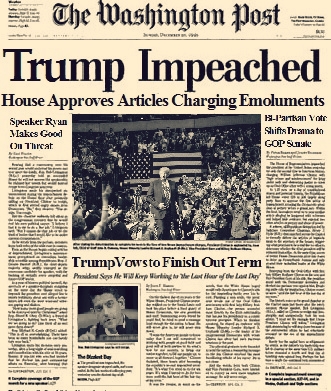Before too many events intervene and before we get to the end of the shutdown-default mess—if there is an end to it—two flaws in John Boehner’s character, or at least defects in his ability to lead the House of Representatives, must be examined and remembered:
1. Boehner’s Word Isn’t His Bond
Last week Senate Majority Leader Harry Reid revealed that Boehner had reneged on a private deal the two had previously made over the Continuing Resolution, the stopgap fund-the-government bill that didn’t get passed and led to the government shutdown. As The Hill reported:
Reid said Boehner never wanted to wage a protracted battle over ObamaCare as part of the negotiations to keep the government running.
“I know that that’s not the path he preferred,” Reid said. “I know that because we met the first week we came back in September and he told me that what he wanted was a clean CR and the $988 [billion] number.
“We didn’t like the 988 number. We didn’t like it but we negotiated. That was our compromise,” Reid added. “The exact bill that he now refuses to let the House vote on. That was our negotiation.”
Moreover:
Reid said he didn’t have to twist Boehner’s arm to get a preliminary deal on a clean stopgap.
“He twisted mine a little bit to get that number,” Reid said.
“Now he refused to let his own party vote because he’s afraid to stand up to something he originally agreed to,” he added.
So, clearly Boehner’s word is no good and if a man’s word is no good how can anyone bargain with him? (The Speaker has had a pattern of such untrustworthy behavior. See here and here, for instance.)
2. Boehner’s Dishonesty Is Breathtaking
Before he shamefully began to demagogue the issue of the “exemption” from ObamaCare for Congress and its staff—which is not an exemption at all—Boehner personally and secretly asked Democrats for help in protecting the employer contribution for health insurance premiums (misleadingly called “subsidies”) for congressional lawmakers and staff (the staff members definitely in need of the employer contribution, even if some lawmakers, those with lots of money, aren’t).
First a little background on this ridiculous issue from USA Today:
During the 2010 debate over the Affordable Care Act, Sen. Chuck Grassley, R-Iowa, proposed an amendment requiring members of Congress and their staffs to purchase health insurance though state exchanges. Democrats, viewing the amendment as a political stunt, co-opted the idea as their own and inserted it into the bill.
But the provision was silent about who would pay for that insurance, or how those payments would be treated. The exchanges were intended for uninsured people who couldn’t get health insurance through their employer or qualify for Medicaid. Those who had access to health benefits meeting minimum coverage levels could still purchase insurance on the exchanges — but without a subsidy and using after-tax income.
Holding members of Congress and their staffs to that standard would have the effect of stripping them of the employer-paid health coverage they currently get, which is the same as any other federal employee. So the Office of Personnel Management issued a proposed rule in August making clear that the government would continue to pay the employer contribution for congressional health benefits at the same rate as if members were still on the federal plan.
Grassley now says that was his intent all along. “My goal, regardless of how the amendment was worded … was that we need to go into the exchange so that we would have to go through the same red tape as every other citizen,” he told Roll Call Thursday. But because of what Grassley called a “drafting error,” the amendment left out language that would have explicitly given lawmakers the same before-tax employer contribution as any other federal employee gets.
Some of Grassley’s Republican colleagues have a different interpretation. Sen. David Vitter, R-La., introduced an unsuccessful amendment to the spending bill that would have required members of Congress to pay the full cost of their health care.
What ultimately caused this demagogue-friendly problem is that Democrats foolishly allowed Grassley’s ill-conceived and poorly-written amendment to become part of the law and when it became clear how confused and confusing the amendment was, members of both parties sought to get relief from its potential impact. But the demagogues, like David Vitter and others, saw a political advantage in exploiting the confusion. Enter John Boehner. Politico reported:
With the federal government nearing shutdown, House Speaker John Boehner stood on the House floor Monday and called on his colleagues to vote for a bill banning a “so-called exemption” that lawmakers and staffers receive for their health insurance.
“Why don’t we make sure that every American is treated just like we are?” Boehner asked, seeking to prohibit members of Congress and Capitol Hill aides from getting thousands of dollars in subsidies for their health insurance as they join Obamacare-mandated insurance exchanges.
Yet behind-the-scenes, Boehner and his aides worked for months with Senate Majority Leader Harry Reid (D-Nev.), House Minority Whip Steny Hoyer (D-Md.), and others, to save these very same, long-standing subsidies, according to documents and e-mails provided to POLITICO. Senate Minority Leader Mitch McConnell (R-Ky.) was also aware of these discussions, the documents show.
So, we have the Speaker privately doing one thing and publicly doing another, cynically using hard-working congressional staff members as pawns in the game he is playing on behalf of Tea Party crazies.
Given these two stunning examples of a lack of integrity and a lack of honesty on the part of the Speaker of the House, Democrats should have little sympathy for him and should continue to let him twist in the wind of condemnation that is blowing into the Republican House. We can only hope that the Speaker will, in the end, have enough patriotism in his bones not to let the country default on its obligations, even if he has defaulted on his.








Anonymous
/ October 21, 2013Thanks for clearing up the issue of Congressional exemption from the ACA. Your effort here shows why this issue is confusing and why the media has not taken the time to do so. Perhaps you should re-post the ACA part with a different headline. Perhaps the Globe would post it?
Kabe
LikeLike
R. Duane Graham
/ October 22, 2013If I get around to writing something up, I may submit it to the Globe. Not sure we’re on speaking terms, if you know what I mean.
LikeLike